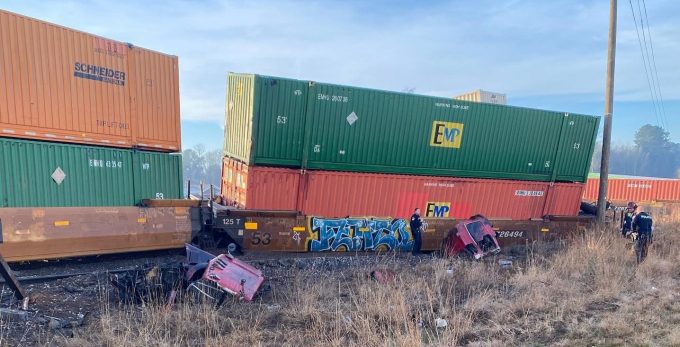New STB chair orders railway CEOs to attend forum on declining volumes
Robert Primus, the new chairman of the US Surface Transportation Board (STB), has called in ...
TFII: SOLID AS USUALMAERSK: WEAKENINGF: FALLING OFF A CLIFFAAPL: 'BOTTLENECK IN MAINLAND CHINA'AAPL: CHINA TRENDSDHL: GROWTH CAPEXR: ANOTHER SOLID DELIVERYMFT: HERE COMES THE FALLDSV: LOOK AT SCHENKER PERFORMANCEUPS: A WAVE OF DOWNGRADES DSV: BARGAIN BINKNX: EARNINGS OUTODFL: RISING AND FALLING AND THEN RISING
TFII: SOLID AS USUALMAERSK: WEAKENINGF: FALLING OFF A CLIFFAAPL: 'BOTTLENECK IN MAINLAND CHINA'AAPL: CHINA TRENDSDHL: GROWTH CAPEXR: ANOTHER SOLID DELIVERYMFT: HERE COMES THE FALLDSV: LOOK AT SCHENKER PERFORMANCEUPS: A WAVE OF DOWNGRADES DSV: BARGAIN BINKNX: EARNINGS OUTODFL: RISING AND FALLING AND THEN RISING

Labour unions have described the derailment of a Norfolk Southern (NS) train near Pittsburgh this month as a wake-up call for stronger safety measures and increased regulatory oversight.
The NS train, with three locomotives and 150 rail cars, derailed on 3 February, with 38 rail cars coming off the rails, including 11 carrying hazardous materials: five were loaded with vinyl chloride, a flammable and highly toxic chemical; the others carried highly flammable liquids.
The ensuing fire damaged another 12 rail cars, and the area had to be evacuated.
There have been reports of farm animals and wildlife dying, allegedly as a result of the spill of highly toxic chemicals and, according to one report, residents and business owners in the area have filed at least four class action suits.
On Monday, a crash between an 18-wheel truck and a Union Pacific train near Houston saw the truck driver killed and 21 rail cars, some of which were carrying hazardous material, leave the tracks.
However, financial analysts do not expect to see serious repercussions for the operators in the long run. Two financial institutions pointed out that past accidents – including those with fatal outcomes – failed to dent the valuations of rail carriers involved, beyond a short span.
A derailment of an NS train in 2005, when nine people died and over 550 were admitted to hospital with breathing problems, affected the stock only briefly, one analyst pointed out.
Labour unions, on the other hand, have expressed serious concern, warning of more such incidents in the future. A member of Railroad Workers United, a non-profit labour group that coordinates with the national rail unions, called the NS derailment “the tip of the iceberg”, and warned that the next derailment could be “cataclysmic”.
Others have accused the railways of “playing Russian roulette” with train safety.
The Railroad Workers Union said “risky practices” were part of railway culture and contributed to the derailment, including longer and heavier trains, excessive cuts in maintenance and operating personnel, deferred maintenance, long working hours and limited on-the-job training.
Much of the criticism has been directed at ‘precision railroading’, which has produced significantly higher profits for the Class I railways, but has been fingered as the cause of poor service and performance, as well as an increase in accidents.
Greg Regan, the president of the Transportation Trades Department of the American Federation of Labor and Congress of Industrial Organizations (AFL-CIO), wrote to the Federal Railroad Administration (FRA), saying derailments per train mile and incidents at rail yards had increased significantly in the wake of the implementation of precision railroading at several large railways.
Between 2009 and 2021, about 1,700 train accidents occurred every year in the US, according to the US Bureau of Transportation Statistics. The Pittsburgh region has witnessed eight train derailments over the past five years, according to lobby group Rail Pollution Protection Pittsburgh.
Unions are calling on the FRA to step up its oversight of the railways’ safety measures. One suggestion embraced by the AFL-CIO is for a mandate for the Class I carriers to implement the ‘confidential close call’ reporting system, which gives employees an avenue to report safety concerns anonymously. This has been adopted by some passenger rail carriers, but none of the US freight rail firms, according to the AFL-CIO.
However, regulators may be part of the problem, according to union officials who have criticised a rule introduced by the Department of Transportation in 2020 that allows LNG shipments by rail without additional safety rules. They point out that fires caused by LNG unleash tremendous energy and are extremely difficult to contain.
Such an incident in a populated area could be far more catastrophic than the NS derailment at East Palestine, they said.
Comment on this article